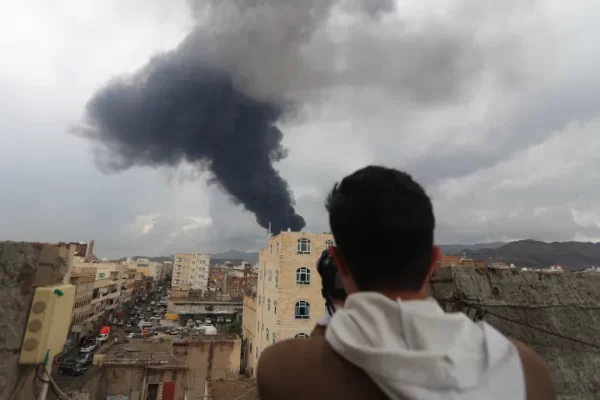
Israeli Military Strikes Yemen’s Capital Sanaa Following Houthi Missile Attacks
Sanaa, Yemen – The Israeli military has carried out air raids on Yemen’s capital, Sanaa, in what it says is retaliation for recent missile and drone attacks launched by the Houthi movement. The strikes mark a significant escalation in the widening regional fallout from Israel’s ongoing war on Gaza. According to Israeli and Yemeni sources, the air strikes early Sunday targeted multiple sites, including an oil facility, a power plant, and what Israel described as a “military complex” housing a presidential palace. The Houthi-affiliated Al Masirah TV confirmed the attacks and reported at least two fatalities and 35 injuries. Video footage verified by Al Jazeera showed plumes of fire and thick smoke rising over the Yemeni capital shortly after the strikes. “The attacks were carried out in response to repeated assaults by the Houthi terrorist regime against the State of Israel and its citizens, including the launch of surface-to-surface missiles and unmanned aerial vehicles,” said the Israeli military in a statement. On Friday, the Houthis claimed responsibility for launching missiles toward Israel, describing their operations as part of a broader effort to pressure Israel to end its military campaign and blockade in Gaza. A Houthi military official told Al Masirah that Yemen’s air defenses had “neutralised most of the Israeli enemy aircraft participating in the aggression and forced them to withdraw.” Houthi Defiance Despite the Israeli air raids, Houthi leaders have vowed to continue their military support for the Palestinian cause. “The Israeli aggression against Yemen will not discourage us from continuing our support for Gaza, no matter the sacrifices,” said Houthi official Mohammed al-Bukhaiti. “The issue is settled for us: either eternity in heaven or eternity in hell.” The air strikes on Sanaa mark the first publicly acknowledged Israeli attacks on Yemen since the escalation of hostilities in Gaza began. Regional analysts warn that the expanding theatre of conflict — from Lebanon and Syria to now Yemen — increases the risk of a broader Middle East war. Tensions have been mounting across the region as Israeli military operations in Gaza, which have drawn widespread international condemnation, continue into their 11th month. Protests, diplomatic backlash, and armed responses from non-state actors have intensified, raising fears of a prolonged and destabilising conflict.

